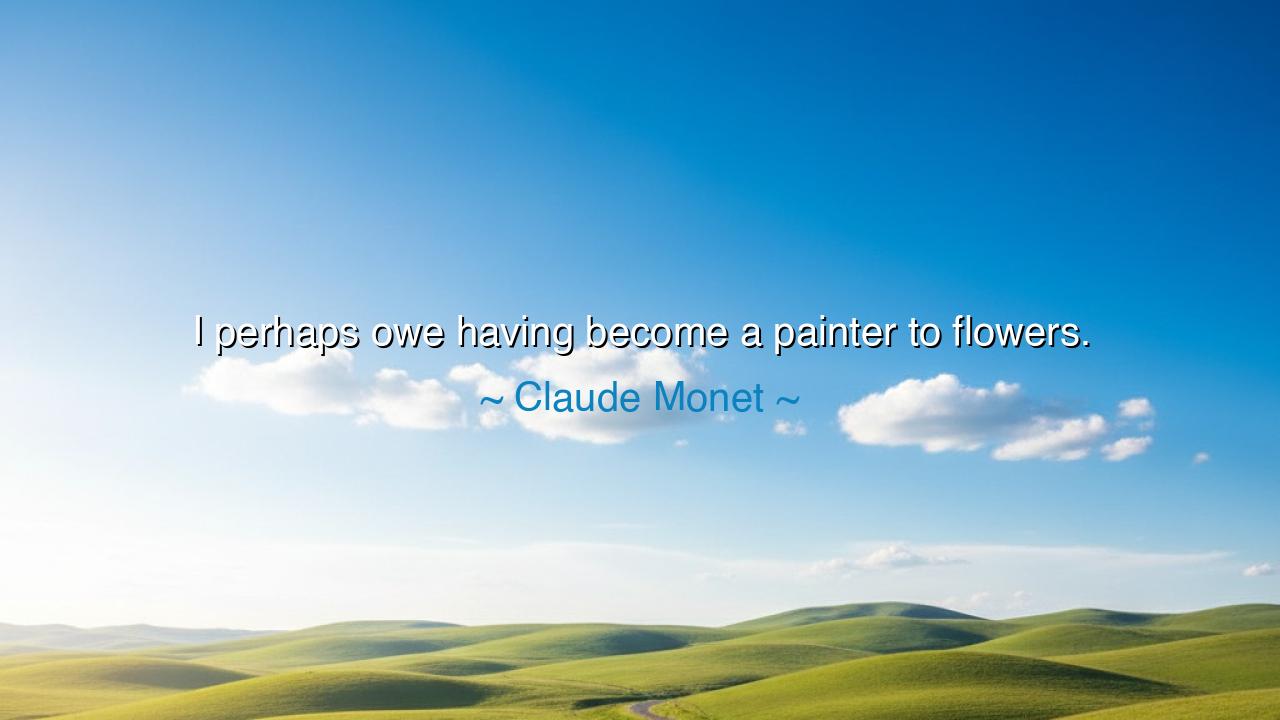
I perhaps owe having become a painter to flowers.






Claude Monet, the father of Impressionism and poet of light, once confessed with simplicity and awe: “I perhaps owe having become a painter to flowers.” These words, soft as petals yet weighty as truth, remind us that often the greatest destinies arise from the humblest inspirations. It was not war, nor wealth, nor royal commission that shaped Monet’s vision — it was the flower, silent yet radiant, fragile yet eternal, which stirred in him the fire to paint and to reveal the world anew.
The origin of this declaration lies in Monet’s lifelong devotion to gardens. He built at Giverny not only a home, but a sanctuary of lilies, roses, irises, and water ponds. For him, flowers were not mere decorations of the earth, but teachers of perception. Their shifting colors under sunlight, their delicate forms swaying in the breeze, revealed to him the truth that reality is not fixed, but ever-changing. To capture this truth, he became a painter, one who would not simply replicate, but translate the fleeting beauty of flowers into eternal vision.
History testifies to this connection. The series of Water Lilies that Monet painted in his later years are not only paintings of blossoms, but meditations on time, on reflection, on the interplay between light and life. He painted them obsessively, hundreds of canvases, as though the flowers themselves commanded him, whispering: “See us not once, but again and again, for we are never the same twice.” In this way, the flower was both subject and master — guiding the painter’s hand, shaping the course of art, and gifting humanity with a vision that outlives the bloom itself.
Yet this truth extends beyond Monet. Many souls have found in flowers the spark of transformation. Consider the poet William Wordsworth, whose wandering encounter with a field of daffodils birthed one of the most enduring verses in English literature. The daffodils, like Monet’s lilies, were not mere plants, but revelations — teaching joy, resilience, and the unity between man and nature. In both artist and poet, the flower became the bridge between perception and creation, between the ordinary and the eternal.
Monet’s words also whisper of humility. He does not claim genius as self-born, nor attribute his gift to his own will alone. Instead, he bows before the simple flower, acknowledging that his art owes its life to the quiet presence of nature. This is the wisdom of the ancients: that man is not the master of inspiration, but its servant. The oak tree, the mountain, the star, the rose — each holds within it a truth that can awaken the artist, the thinker, the seeker. But only the attentive soul will notice, and only the humble will confess their debt.
The lesson for us is clear: seek your flowers. Look for the small, silent things that stir your soul. It may be the song of a bird, the smile of a stranger, the play of light on water. Do not dismiss these as trivial, for within them may lie the seed of your destiny. The world is filled with teachers, but they do not all wear robes or titles; some grow quietly in the garden, waiting for the eye that will truly see them.
What must you do? Train your gaze to notice beauty. When you walk among flowers, do not hurry past; stop, observe, and let them speak. When inspiration stirs, do not silence it, but follow where it leads. And above all, remain humble. Acknowledge the sources of your strength, whether they are people, places, or petals. In gratitude lies the power to deepen your craft and enrich your spirit.
So let Monet’s words echo as a guiding truth: “I perhaps owe having become a painter to flowers.” Remember that greatness often owes its spark to simplicity. Cherish the humble things, for they may shape your destiny more than grand ambitions ever could. And like Monet, let your life become a canvas upon which the beauty of the world leaves its eternal mark.






AAdministratorAdministrator
Welcome, honored guests. Please leave a comment, we will respond soon